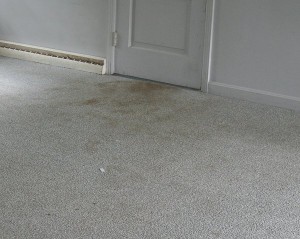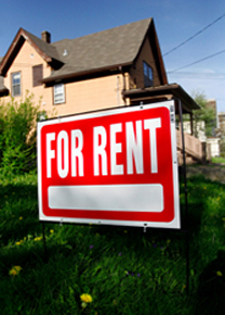Posted by Teresa on January 19, 2010 under Landlord and Tenant FAQs, Landlord Tips | 
The question of pest control in rental properties is often debated. Tenants expect that their rental unit will be pest-free when they move in.—and they expect that the property owner will keep it pest-free. Pests fall under the responsibility of making your property habitable, which your tenants are entitled to.
Some landlords maintain that their responsibility is limited to delivering a house or apartment that is free from vermin or rodents at the time the lease is signed—and that the tenant becomes responsible from then on. This usually comes up after a tenant has moved in and starts seeing bugs or mice. In many cases, the tenant’s living habits are the problem. Whether it’s leaving food out and attracting mice and insects, or failing to report a water leak that rots out a baseboard, lifestyle can certainly contribute to pest issues. In this case, why would the landlord be responsible to pay for pest control?
However, if you’re an apartment building owner, you know how bugs and critters spread throughout an entire building. It only takes one unit to attract pests that become a problem for everyone else. In this case, the landlord would probably need to get control of the situation—on their own dime.
Pests can either be a huge problem or a non-issue, based on where your rental properties are. Some areas are just buggier than others. Some cities have major vermin problems. If you’re lucky to own rental property in an area that is infested with roaches or rats, you’re likely to spend much more time and money fighting them than other landlords. In warmer climates, property owners often take the initiative to keep cockroaches and other problem bugs under control through regular pest maintenance, like spraying.
Fleas are usually considered the tenant’s responsibility. If you allow pets in your rental properties, you might consider requiring pet owners to keep their animals on flea control. If it’s in the lease, and they agree to it, you’ll have some backing if fleas later become a problem. Flea control is especially important when pet-owning tenants move out. Fleas lay eggs that can hatch and surprise the next tenant. Be sure to have a professional service treat the unit for fleas—and the tenants should foot the bill.
 The question of pest control in rental properties is often debated. Tenants expect that their rental unit will be pest-free when they move in.—and they expect that the property owner will keep it pest-free. Pests fall under the responsibility of making your property habitable, to which your tenants are entitled.
The question of pest control in rental properties is often debated. Tenants expect that their rental unit will be pest-free when they move in.—and they expect that the property owner will keep it pest-free. Pests fall under the responsibility of making your property habitable, to which your tenants are entitled.
Some landlords maintain that their responsibility is limited to delivering a house or apartment that is free from vermin or rodents at the time the lease is signed—and that the tenant becomes responsible from then on. This usually comes up after a tenant has moved in and starts seeing bugs or mice. In many cases, the tenant’s living habits are the problem. Whether it’s leaving food out and attracting mice and insects, or failing to report a water leak that rots out a baseboard, lifestyle can certainly contribute to pest issues. In this case, why would the landlord be responsible to pay for pest control?
However, if you’re an apartment building owner, you know how bugs and critters spread throughout an entire building. It only takes one unit to attract pests that become a problem for everyone else. In this case, the landlord would probably need to get control of the situation—on their own dime.
Pests can either be a huge problem or a non-issue, based on where your rental properties are. Some areas are just buggier than others. Some cities have major vermin problems. If you’re lucky to own rental property in an area that is infested with roaches or rats, you’re likely to spend much more time and money fighting them than other landlords. In warmer climates, property owners often take the initiative to keep cockroaches and other problem bugs under control through regular pest maintenance, like spraying.
Fleas are usually considered the tenant’s responsibility. If you allow pets in your rental properties, you might consider requiring pet owners to keep their animals on flea control. If it’s in the lease, and they agree to it, you’ll have some backing if fleas later become a problem. Flea control is especially important when pet-owning tenants move out. Fleas lay eggs that can hatch and surprise the next tenant. Be sure to have a professional service treat the unit for fleas—and the tenants should foot the bill.
Posted by Teresa on January 5, 2010 under Landlord and Tenant FAQs, Landlord Tenant Lawsuits | 
 Where are landlords required to place security deposit funds in FDIC-insured institutions? Are you allowed to earn interest on your tenant’s security deposit, or must you turn interest over to the tenant at the end of the lease? How long are you legally allowed to hold the deposit after your tenant moves out?
Where are landlords required to place security deposit funds in FDIC-insured institutions? Are you allowed to earn interest on your tenant’s security deposit, or must you turn interest over to the tenant at the end of the lease? How long are you legally allowed to hold the deposit after your tenant moves out?
Every state has its own laws regarding how landlords handle security deposits. As a rental property owner, you must be familiar with your state and local regulations.
Here are some general guidelines that can help keep you on the up-and-up in most states. Dealing with your tenants as fairly, openly, and honestly as possible is the first step to keeping security deposit headaches to a minimum.
Interest: In many states, landlords with a minimum number of units are required to place security deposits in interest-bearing savings accounts. Some require separate accounts for each tenant; others allow one account, but no comingling of the landlord’s own funds. If you reside in one of these states, you have the choice of paying the interest at the end of the lease, or for long-term tenants, paying the interest once or twice a year. With interest rates currently low, the total interest earned is not much. We know a landlord who gives his tenants their interest checks each year in December—just in time for the holidays.
Rent vs. Deposit: Do not confuse the two, nor allow your tenants to do so. Rent is rent. The security deposit is meant to cover the property owner’s expenses if the tenant fails to keep the property in good working order or to cover tenant damages. If a tenants gives notice and expects you to keep the security deposit as last month’s rent, you may have grounds for eviction. Clearing up the tenant’s misunderstanding is probably a simpler way to go, however. Tip: be sure to include clear language in your lease about the amount of the security deposit, when and under what circumstances the tenant will receive it after the lease ends, and that it may not be used in lieu of rent payment.
Deductions: A move-in inspection and checklist, compared with a move-out inspection and checklist, will likely dispel any conflicts over deductions for cleaning, repairs, and damages. Conduct the move-out inspection with your tenant. Point out items that must be replaced or repaired. Obtain their signature to prove they were present and agree to the list of damages. Then, be reasonable about costs—recover your expenses, but don’t gouge your tenants.
Time Limitations: Landlords must deal with security deposits in a timely manner after the tenant moves out. It’s not fair to drag the process on indefinitely, keeping the tenant’s money tied up. Do the right thing and deal with damages, send an accounting of what was deducted from the deposit, and include a check for the balance to your tenant as soon as possible. Besides, most states require landlords to supply an explanation within a certain number of days.
Second Chance: Times are tough for almost everyone. Why not be an exceptional landlord and help your good tenants keep more of their hard-earned money? After the move-out inspection, set up a second walk-through to give the tenant a chance to right the wrongs you point out. Most tenants are capable of performing minor repairs and giving the unit a good scrubbing. Clearly communicate your expectations and give the tenant a chance to meet them.
We recommend you also automatically screen all tenants as part of your application process. For more landlord resources, including forms and information on tenant screening, turn to E-Renter.com. .
Posted by Teresa on December 30, 2009 under Landlord and Tenant FAQs, Rents and Deposits, Screening and Background Checks | 
If one of your New Year’s Resolutions is to increase your cash flow, one way to do so is through application fees. Landlords and property managers use these fees to recover their expenses for background screening, credit checks, and the time it takes to vet a potential tenant.
If you’re really lucky and have several applicants for the same unit, you may opt to screen the best (on paper) applicant first and refund the fees to the remaining applicants. Or, you can screen all at once and choose the strongest applicant. In this case, the other applicants would not receive refunds, since the background check was conducted.
If you decide to keep application fees to cover expenses, avoid issues with applicants by stating very clearly both verbally and on the written application that fees are non-refundable. You’ll also want to determine your policy for refunding fees in the event the tenant changes his or her mind about going through with the rental agreement.
Obviously, a landlord would want to avoid accepting any deposit funds until all background screening has been completed and the tenant’s application approved.
Check your state and local laws for guidance—laws vary greatly and you could face limitations on keeping fees and/or time constraints for returning them. If your application fee policy is questioned, be ready to prove expenses with accounting records. Keep the application fee on a different line item from security deposits and rents in your books.
Smart—and honest—landlords also avoid questions of integrity around fees by only accepting applications for units that are truly available, and by doing some initial screening prior to running the tenant background check. If the applicant’s income is below your minimum, do everyone a favor and just turn down the application.
 If one of your New Year’s Resolutions is to increase your cash flow, one way to do so is through application fees. Landlords and property managers use these fees to recover their expenses for background screening, credit checks, and the time it takes to vet a potential tenant.
If one of your New Year’s Resolutions is to increase your cash flow, one way to do so is through application fees. Landlords and property managers use these fees to recover their expenses for background screening, credit checks, and the time it takes to vet a potential tenant.
If you’re really lucky and have several applicants for the same unit, you may opt to screen the best (on paper) applicant first and, upon approval, refund the fees to the remaining applicants. Or, you can screen all at once and choose the strongest applicant. In this case, the other applicants would not receive refunds, since the background check on each was conducted.
If you decide to keep tenant application fees to cover expenses, avoid issues with applicants by stating very clearly both verbally and on the written application that fees are non-refundable. You’ll also want to determine your policy for refunding fees in the event the tenant changes his or her mind about going through with the rental agreement.
Obviously, a landlord would want to avoid accepting any deposit funds until all background screening has been completed and the tenant’s application approved.
Check your state and local laws for guidance—laws vary greatly and you could face limitations on keeping fees and/or time constraints for returning them. If your application fee policy is questioned, be ready to prove expenses with accounting records. Keep the application fee on a different line item from security deposits and rents in your books.
Smart—and honest—landlords also avoid questions of integrity around fees by only accepting applications for rental units that are truly available, and by doing some initial screening prior to running the tenant background check. If the applicant’s income is below your minimum, do everyone a favor and just turn down the application.
Posted by Teresa on November 23, 2009 under Landlord and Tenant FAQs | 
 Sometimes a tenant needs to move before the lease is up. In a good rental market, a landlord can find a new tenant without much time or effort. When there are more tenants than rental units, landlords have the luxury of choice regarding allowing tenants to sublet.
Sometimes a tenant needs to move before the lease is up. In a good rental market, a landlord can find a new tenant without much time or effort. When there are more tenants than rental units, landlords have the luxury of choice regarding allowing tenants to sublet.
However, when the rental market has excess inventory and filling vacancies is more difficult, a tenant who wishes to sublease to another person could be doing the landlord a favor. Certainly, the hassles of advertising and showing the rental unit are eliminated—but there are plenty of issues to consider before allowing a sublease.
In a sublease situation, the tenant who wishes to move without breaking his or her rental agreement “leases the lease” to someone else, who agrees to uphold the terms of the agreement. The original signer is still responsible for the lease, and the landlord must approve the arrangement.
But tenants don’t always seek landlord approval. If you’re receiving rent checks signed by Amy Doe for a unit that was leased to Jane Smith—you may have an unapproved sublease situation. You are under no obligation to accept Jane Smith’s sublease if you did not agree to it. Check with your legal advisor, but you may be able to start eviction proceedings in this case.
In this challenging rental market, it might be a good idea to offer Amy Doe a new lease—if she passes your tenant screening procedures first. It is entirely up to the landlord to decide whether to enter into the agreement or evict.
Posted by Teresa on September 28, 2009 under Landlord and Tenant FAQs, Landlord Tips | 
 If you’re buying your first rental property, you probably have a list of questions a mile long. How much rent should I charge? How do I know if I’m paying too much for the property? How do I make money? How do I choose tenants? How do I choose a rental property in the first place?
If you’re buying your first rental property, you probably have a list of questions a mile long. How much rent should I charge? How do I know if I’m paying too much for the property? How do I make money? How do I choose tenants? How do I choose a rental property in the first place?
This post is about that last question: How does a landlord choose a rental property? If you put that question to a hundred landlords, you’ll probably get a hundred different answers. Different properties work for different people—for different reasons! Of course one must consider price, return on investment and expenses when evaluating rental property—but smart landlords also consider their future tenants, too.
Identify your target tenants: Every business needs a thorough plan, including your rental business! Include a profile of the type of tenant you want to attract. Remember that you cannot discriminate on the basis of race, gender, religion, ethnicity, family structure, or disability—but you are certainly free to limit your tenants to the ones who can pay rent on time and who are within a certain income bracket. If you want higher-income professionals, don’t buy a multi-unit building in a shady section of town. If you want to rent to stable families or well-employed folks, concentrate on the type of unit they will want to call “home.” If you don’t care what type of tenant you have, as long as they pay the rent on time, then the type of property does not matter as much. Some people will rent anything, anywhere.
Think about what your target tenants want: Some landlords like the low-rent business—they find inexpensive properties in lower-rent areas of town, and make a nice profit on them. But purchasing a rental property in a higher crime area will not attract families looking for a safe place to raise children. They prefer safe, owner-occupied areas, because they want to live in a nice neighborhood. Location is most important to tenants, so evaluate the area’s offerings: safety, good schools, shopping, and convenience to amenities, like parks.
What type of turnover will the property have? Again, it’s a question of stability. Longer-term tenants will settle in a home. Shorter-term tenants often think of their current rental as a temporary stop on the way to the next place. You might make more money on the latter, by charging a higher rent or increasing the rent with each turnover, but the headaches that go along with high turnover are not for everyone.
How many bedrooms should you look for? Again, it depends on the type of tenant you want to attract. Want singles? Buy units with one bedroom. Want families? Look for three-bedroom homes.
Curb appeal: If you’re considering purchasing a that looks sad from the street, consider what you can do to improve it. Whether or not you take a pass depends on the price and the investment needed to make the unit attractive. Just as homebuyers are attracted to a nice-looking home, so are the best tenants. If you don’t care about what your rental property looks like, you’ll attract tenants who don’t care about where they live.
Posted by Teresa on September 11, 2009 under Landlord and Tenant FAQs, Landlord Tips | 
 What are the guidelines when it comes to a landlord’s ability to enter a tenant’s apartment or house? It depends on your state’s laws, but in most, the landlord must provide notice prior to entering a tenant’s home.
What are the guidelines when it comes to a landlord’s ability to enter a tenant’s apartment or house? It depends on your state’s laws, but in most, the landlord must provide notice prior to entering a tenant’s home.
Do check your state’s landlord/tenant laws: they can range from “no notice required” in Massachusetts, New Jersey, and several other states; to 12 hours in Florida; to 48 hours in Vermont.
Don’t worry about advance notice in cases of emergency, such as natural gas odor, smoke or fire, or a water leak.
Don’t “knock and unlock.” Allow your tenants to answer the door, even if they are expecting you.
Don’t assume they’re not at home and let yourself in.
Do offer more than the required notice if you can.
Do specify a window of time they can expect you. And try to stick to it. Call them if you’re delayed or early.
Do leave your tenant’s home in the same condition you found it. If your shoes are muddy, remove them before entering. And clean up after yourself.
Do conduct inspections and maintenance on your rental properties with the goal of maintaining your tenants’ privacy, too!
Posted by Teresa on August 10, 2009 under Landlord and Tenant FAQs, Landlord Tenant Lawsuits, Landlord Tips | 
 Landlord vs. tenant issues seem to occur in the same general areas. One item that landlords and tenants frequently clash over is flooring. Whether your rental unit floors are covered with carpeting, hardwood, or tile, you and your tenants will likely have issues with them at some point. We’ve put together some guidelines to help deal with damages or requests for replacement.
Landlord vs. tenant issues seem to occur in the same general areas. One item that landlords and tenants frequently clash over is flooring. Whether your rental unit floors are covered with carpeting, hardwood, or tile, you and your tenants will likely have issues with them at some point. We’ve put together some guidelines to help deal with damages or requests for replacement.
Determine the extent of the damage. Are you seeing normal wear and tear, minor damages, or major damages?
Normal means high-traffic areas are starting to show wear.
Minor damages include:
- Carpet indentations
- Minor scratches in wood floors
- Color fading
Major damages include:
- Stains
- Burns
- Carpet wrinkling
- Deep scratches in wood
- Gouges in laminate
- Chipped or broken tiles
- Carpet odors
Determine the cause of the damage. Keep in mind that some of the above issues may be a result of the quality of floor covering or the installation method—and may not be your tenants’ fault. Improper tile installation can lead to cracks. Poor quality carpet will wear quickly. Obviously, pet stains and odors, burns, or food stains that were not present at move-in are the responsibility of your tenant.
Can the damage be repaired? Most flooring can be, so you might be able to avoid the cost of replacement. Contact a local flooring contractor or installer to provide an estimate for repair. You can require your tenant to take care of the bill if they are at fault.
How old is the flooring? Carpet and laminate will wear out. If you have 20-year-old carpet in a rental unit, then obviously, it should be replaced. And, low-quality, inexpensive carpet won’t last even five years under heavy use. The more people and animals walking on it, the quicker it will wear out! You’ll attract a higher-quality tenant with newer flooring.
So what’s the best flooring to avoid landlord and tenant issues? Unfortunately, there is no “best” flooring choice when it comes to rental units. Many landlords we hear from prefer hardwood, such as oak. It’s tough and lasts for hundreds of years with proper care. In older homes, hardwood can be painted to reduce upkeep and hide signs of wear.
If you want to install carpet, use your best judgment. Keep price and quality in line with the level of rent you are charging. Spell out your tenants’ responsibilities when it comes to caring for the floors, and thoroughly document the floor’s condition at move in and again at move out. That way, if damages occurred during the tenant’s stay, you have proof enough to deduct the amount from the security deposit—or to charge them more to cover the difference.
For more landlord resources, including forms and information on
tenant screening, turn to
E-Renter.com. You’ll know that you have the best possible tenants when you
prescreen tenants.
Posted by Teresa on July 31, 2009 under Landlord and Tenant FAQs, Tenant Screening & Background Checks | 
 Managing rental property is really about managing people—and since there are all kinds of people, you’ll be dealing with all kinds of unusual and interesting requests from tenants. Just when you think you’ve heard them all, a new tenant will ask for a favor, or a prospective tenant discloses something you’ve never dealt with.
Managing rental property is really about managing people—and since there are all kinds of people, you’ll be dealing with all kinds of unusual and interesting requests from tenants. Just when you think you’ve heard them all, a new tenant will ask for a favor, or a prospective tenant discloses something you’ve never dealt with.
Here are a few issues you might not have encountered before:
A prospective tenant intends to run a daycare from your property: You’ll definitely want to run this by your insurance company and possibly even your attorney. In case of injury, any liability could be considered shared between you and the day care provider. You may not reject their application solely for this reason in certain states. Check your local and state laws to protect yourself. If everything checks out and you feel comfortable with the situation, you’ll also want to check your local zoning laws, and require your tenant to hold liability insurance with yourself named as additional insured.
On the flip side: you discover a tenant is running a daycare without your permission: If the tenant did not disclose the business up front, you may have grounds for eviction.
A new tenant wants to prepay a year’s rent: At first glance, this might not seem like a problem. But you should definitely check out the tenant’s income source by running a background screen. If they have legitimate income and otherwise pass the screening, you might want to consider the request. But don’t spend it all at once—six months down the road, they may decide to move!
If you allow pets in your units, should you allow a pit bull? Check with your insurance company. They usually have a list of “vicious” dogs that are not allowed under their coverage. Even if the dog is friendly and well-behaved, if your insurance company says “no,” you should, too.
If you don’t allow pets, what about a seeing eye dog? We’ve covered this topic in this blog before. Service animals are not considered pets, and are not subject to pet restrictions.
If you do allow pets, should you charge a pet deposit for a service animal? While you are certainly allowed to, most landlords do not. Again, since service animals are not considered pets, your normal pet rules do not apply.
Posted by Teresa on July 28, 2009 under Landlord and Tenant FAQs | 
 Determining how much rent to charge is not easy. How do you know what your market will bear? Since your goal as a landlord is to make a profit on your rental properties, you want to get as much as possible, right?
Determining how much rent to charge is not easy. How do you know what your market will bear? Since your goal as a landlord is to make a profit on your rental properties, you want to get as much as possible, right?
Setting rent too low will decrease your chance to make a profit. But setting it too high could chase tenants away—and an unleased property won’t make you any profit, either! You want to be like Goldilocks when setting rent: not too high, not too low—you want to set it so that it’s just right!
Some easy ways to determine what your local rental market will bear is to ask real estate agents, read the local advertisements, or look at Craigslist.com. You can also find out what the Fair Market Rent for your area is.
What is Fair Market Rent?
Fair Market Rent refers to the amount of money a property will lease for. It is determined by a number of variable factors, such as location, local economic conditions, market need, and the community cost of living.
The U.S. Department of Housing and Urban Development (HUD) uses Fair Market Rent (FMR) values to determine the eligibility of rental housing units for housing assistance, known as Section 8 payments. The values are designed to be high enough to ensure an adequate supply of rental units, but low enough to serve as many families as possible.
Landlords can use FMR to determine the amount to charge for a rental unit. Setting rent at or slightly below FMR is smart because a fair rent will draw tenants—who usually know the market they live in and will not be willing to pay above-market rents.
Fair market rents also indicate whether a rental market is appreciating or declining in value, which can help prospective income property owners decide where to invest.
HUD publishes the Fair Market Rents for every metropolitan area in the United States, which is accessible on their website: http://www.huduser.org.
Landlords can also check out rentometer.com, which uses a proprietary algorithm to tell you if the rent you are charging for a property is too low, way too high, or reasonable. Just enter the address, number of bedrooms, and rent you are considering, and you’ll get an idea of what other units in the neighborhood are renting for.
Doing your homework before setting the rent for your rental property will help ensure both profits and tenants!
Posted by Teresa on July 21, 2009 under Landlord and Tenant FAQs, Landlord Tips | 
 Now that we’re in the middle of summer, some of you might be wondering how to handle taking care of the outside of your rental property. Whose responsibility is it to mow the lawn and trim the shrubs? Landlord or tenant?
Now that we’re in the middle of summer, some of you might be wondering how to handle taking care of the outside of your rental property. Whose responsibility is it to mow the lawn and trim the shrubs? Landlord or tenant?
Landlord practices are as varied as the colors of summer flowers. If your current procedure works, great! If not, here are some options you can explore, according to our informal survey of landlords:
Multi-unit building: Most agree it’s up to the landlord to maintain the common areas in an apartment complex.
Duplex: Our poll shows a majority requiring the tenants to keep up the lawn. Each tenant can be responsible for their half of a side-by-side; two-story tenants can take care of either the front yard or back yard.
Single Family Residences: These lawns are the tenant’s responsibility in almost all cases. Some landlords will supply the lawn mower (but certainly not the gas!). Be aware of two important facts: 1. You are incurring liability if you do supply a lawn mower for tenant’s use; and 2. If it’s a cheap one—it will break down.
Hiring a Service: Lots of landlords, especially those with multiple properties, hire a landscaping and lawn service to take away the hassle of mowing lawns or making sure their tenants do. Most add the cost into the rent.
Landlords Who Mow: Many landlords replied that they mow their own lawns, either because that’s how it’s done in their area, or because it gives them an opportunity to check on their properties. Good idea! While it could be a major time consumer for you, it could make things easier overall—no issues with enforcing your rules!
Lease Language: If you expect your tenants to mow their own lawns, you must say so in your lease agreement. You can include language stating that if the tenant fails to keep the lawn mowed according to your wishes, you reserve the right to hire a professional and charge it to the tenant.
Whether you mow your tenant’s lawn or require them to do so, landscape maintenance is constant issue–and can be a major headache–for most landlords.
For more landlord resources, including forms and information on
tenant screening, turn to
E-Renter.com. You’ll know that you have the best possible tenants when you
prescreen tenants.
 The question of pest control in rental properties is often debated. Tenants expect that their rental unit will be pest-free when they move in.—and they expect that the property owner will keep it pest-free. Pests fall under the responsibility of making your property habitable, to which your tenants are entitled.
The question of pest control in rental properties is often debated. Tenants expect that their rental unit will be pest-free when they move in.—and they expect that the property owner will keep it pest-free. Pests fall under the responsibility of making your property habitable, to which your tenants are entitled.







 Determining how much rent to charge is not easy. How do you know what your market will bear? Since your goal as a landlord is to make a profit on your rental properties, you want to get as much as possible, right?
Determining how much rent to charge is not easy. How do you know what your market will bear? Since your goal as a landlord is to make a profit on your rental properties, you want to get as much as possible, right?